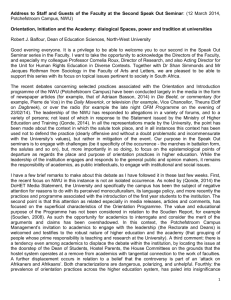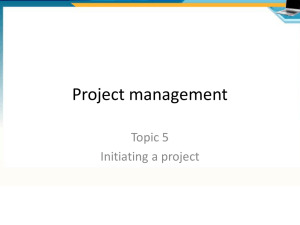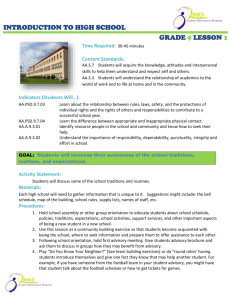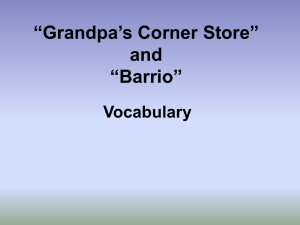Seminar 2 - Dialogical Spaces
advertisement
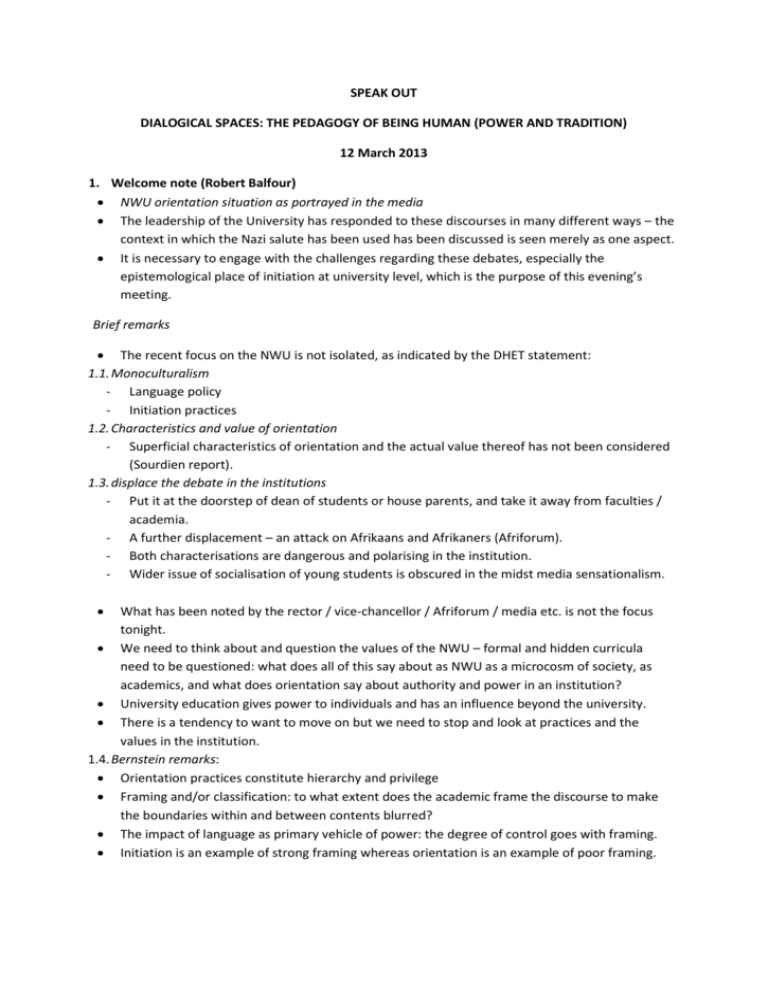
SPEAK OUT DIALOGICAL SPACES: THE PEDAGOGY OF BEING HUMAN (POWER AND TRADITION) 12 March 2013 1. Welcome note (Robert Balfour) NWU orientation situation as portrayed in the media The leadership of the University has responded to these discourses in many different ways – the context in which the Nazi salute has been used has been discussed is seen merely as one aspect. It is necessary to engage with the challenges regarding these debates, especially the epistemological place of initiation at university level, which is the purpose of this evening’s meeting. Brief remarks The recent focus on the NWU is not isolated, as indicated by the DHET statement: 1.1. Monoculturalism - Language policy - Initiation practices 1.2. Characteristics and value of orientation - Superficial characteristics of orientation and the actual value thereof has not been considered (Sourdien report). 1.3. displace the debate in the institutions - Put it at the doorstep of dean of students or house parents, and take it away from faculties / academia. - A further displacement – an attack on Afrikaans and Afrikaners (Afriforum). - Both characterisations are dangerous and polarising in the institution. - Wider issue of socialisation of young students is obscured in the midst media sensationalism. What has been noted by the rector / vice-chancellor / Afriforum / media etc. is not the focus tonight. We need to think about and question the values of the NWU – formal and hidden curricula need to be questioned: what does all of this say about as NWU as a microcosm of society, as academics, and what does orientation say about authority and power in an institution? University education gives power to individuals and has an influence beyond the university. There is a tendency to want to move on but we need to stop and look at practices and the values in the institution. 1.4. Bernstein remarks: Orientation practices constitute hierarchy and privilege Framing and/or classification: to what extent does the academic frame the discourse to make the boundaries within and between contents blurred? The impact of language as primary vehicle of power: the degree of control goes with framing. Initiation is an example of strong framing whereas orientation is an example of poor framing. The practice is part of the identity of the institution, however, the student population in the university world is diverse to such an extent that the traditions of the medieval cannot be sustained. Therefore, it needs to be rethought: With the development of feminism came the first contestation toward exclusion in the university system, and it has changed the way the institution of higher education think about themselves (should not promote hierarchy, age, sex, etc.). The strong initiation and weak orientation is problematic to societies especially where social transformation is still underway. It can therefore be deduced that hierarchical relations between students are problematic in that they are not reflective of a university aiming at an open institution. Are these practices necessary for the development of a young critical citizenship and intellectual context? What kind of identity have we in mind for the NWU? If people are diverse and so are values, should there or can there be only one identity fostered? To what extent does the use of Afrikaans provide a monocultural context? This Afrikaans identity should not be denied; instead, what we want to debate is the extent to which this identity is problematic for diversity. Theorists say that monoculturalism is bad for diversity, therefore, this is the area that we need to focus on. 2. Panel discussions 2.1. JP Rossouw The values considered and mentioned during all of these discussions taking place should be done so in terms of the Constitution (dignity, equality, freedom) in addition to the NWU’s values. Mission element 2 - Hostels have own purposes, but it cannot be beyond that of the university - No mention of an underlying Nazi idea. 5 myths : About social and cultural transformation - (1) Power abuse is limited to this university If we expect students to eliminate all power relations, we are asking too much since our social context is full of skewed power relations - (2) Removing all traditions is the solution to ensuring sound student interaction Any tradition based on fear, discrimination or intimidation must be eliminated; however, there are good existing traditions that we should take into account. - (3) campus and hostel life lacks integration of cultural group (4) hostel life lacks tolerance for diversity (5) First year students have a dreadful life, characterised by oppression to conform Most students who are part of hostels are found to have no problem adapting, with very few who struggle to conform. However, in hostels, students with psychological problems are increasingly found, and some find it challenging to be in groups. Therefore, it is necessary to distinguish between the realities of those traditions that need to be kept and and those that need to be phased out. 2.2. Cornelia Roux It is necessary to understand diversity from a human being perspective. A popular and common definition for diversity holds that each individual is unique and we therefore have individual differences. But should we not define diversity in terms of being human, i.e. the individual, acceptance, safe environment and respect? Understanding one another beyond simple tolerance out of respect? Since the historical symbols and context reflect a single group consciousness, a safe environment cannot include such symbols. We need to challenge the conditioning of a group and society through critical reflection about our historical context. Nostalgia: human rights are not internalized as values yet – whether under violation or enjoyment of human rights The University should be a platform where human rights are discussed and students are not moulded. 2.3. Johan Botha Definitions: - According to Fiske, a sense of belonging is necessary for an individual’s survival in a social group – people need to engage in close relationships with others (myself in relation to the other). - According to Gardner, traditions preserve generations despite the passing of time, custom or habit; people engage with it uncritically because it is always done. - Power can have emotional and attitudinal influence. - Power and hierarchy are part of social structure, and exercise of power has clear cultural roots which can affect or persuade someone to behave in a particular way. - Power can also dominate, enforce punishment and control to make people do something they would not usually do. - Therefore, power can also make a group of people feel unwelcome, belittled, humiliated, repressed, helpless, scared, and anxious. - Learned behaviour can be conditioned through symbolic modelling and including an element of reward. - The seniors or actors of a hierarchical system (they play their roles) are the ones possess the power; thus they can get others to adapt through their control – as one moves up the hierarchy one gains the power. There are 5 stages of group development: - forming, - storming, - norming (change own values to adapt to group, strong sense of trust), - performing, and - adjourning (take certain values into other contexts/groups). A problematic area in post conflict lies in changing the system – the actors are not included in the systematic change and thus, power is not addressed. Do we understand what tradition and hierarchy are and how to deal with contrasting viewpoints? As an academic, I do not understand what the orientation is all about; so do the house committees even know? These questions need to be addresses if a breeding ground for aggression is to be prevented. Orientation is not the problem – the leadership’s understanding of what orientation is all about needs to be reshaped, otherwise we will not change anything. 2.4. Jaco Lubbe Language is part of what makes us human. If you kill a language, you will kill a people. Therefore, provision needs to be made for everybody. The purpose of a tertiary institution is to teach students how to think critically, and it is patriarchal attitudes that control critical thinking. The University media express the freedom for academic discourse. Surviving misconceptions are considered tradition, and if you do not think according to these beliefs you are branded an outsider. This aspect needs to change. Language only becomes a problem if it is used to exclude. ONLY good traditions should be kept: traditions of a caring culture. However, these good traditions are undermined as a result of the bad traditions. A national shift in consciousness is necessary – a paradigm shift, inherent against racism, initiation, etc. – think for yourself; just because everyone else is doing it does not mean we have to. During the formative years scholars should already be taught on human rights and values, and teachers should also be trained to do this. 2.5. Jane-Louise Venter Context: Naivety under young people. Honesty and integrity through human rights. Unequal treatment that people receive on this debate. Inclusivity as part of diversity. People are scared to acknowledge. Freedom as part of human rights [Bronteks: “Vryheid as deel van mense regte] There seems to be a feeling of unbelonging, but the hostel is not that bad if surrounded by people who feel like you – there are people who overstep the boundaries of their power; however, there are also those who are just and fair. R&I (Reception and introduction; “O&B”) teaches you about the campus (where the faculties, registration, restaurants, are, etc.). 2.6. Anne Verhoef Initiation – can it be part of a pedagogical space of human existence? Yes or no? The reception programme, or R&I (“O&B”), are just nice words to disguise initiation practices. Could it be that the initiation process makes students better people? Some are angry at the idea and think it should be removed, whereas other are in favour of the passing on of traditions that come with initiation. However, initiation is no longer justifiable. Myths: if it is not handled well, is there not an open backdoor for these problems? A justifiable definition of diversity where conformity is not expected. The dangers that lie in use of power – what do we understand under orientation? Against any form of orientation – was and is not a good experience. Other good experience – Jane; sometimes anger manifests in our own good deeds. A minimal model of relative discernment between right and wrong is necessary before a reasonable decision can be made, in order to gain practical wisdom. The worshipping of the hierarchical culture versus subordinate culture construct. Human rights often function on the background of the patriarchal hierarchical model. The biblical model of wisdom is also not sufficient in justifying initiation practices. Why do we then uncritically accept it? I suspect there is a consensus that our human dignity lies in a pedagogical context that is based on human rights. Traditions that test human dignity, should be ridden of. How do you experience the idea of culture? What is the nature of the fields (orientation), and how is it influenced by culture? Lubbe remarks: A caring culture should be promoted – that there are no people who are more or lesser, but that they are all equal. Voluntary participation; but what happens if you do not participate? – Silent oppression is a factor. Continuing hostel or residence involvement is based on academic performance (70%) and hostel/residence participation (30%). - Rubina: Military traditions – are non militaristic styles at other universities then unsuccessful? JP remarks: I don’t understand the relation between humiliation and militaristic group activities. - Rubina: Analogies used are used to compare initiation practices at universities with unprofessional cultural initiation. What is the underlying message? - One student remarked that psychological damage is left. - Another student remarked that students should not be forced to participate in R&I (“O&B”) - Another student added that if you do not participate in everything then you are left out – mainstream thinking. Another student also added that initiation is not important in the first year because they are restricted from thinking and acting by themselves.

